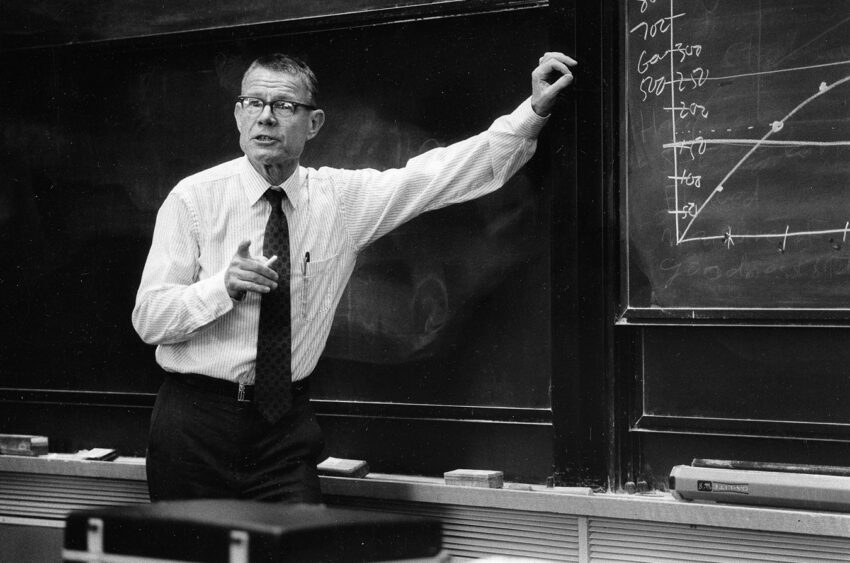Thomas Schelling was a senior staff member of the RAND Corporation from 1958-1959 (recall that the “Prisoner’s Dilemma” was developed in 1950 by RAND Corporation mathematicians in order to test “The Nash Equilibrium”). Schelling’s Cold War analysis of the nuclear arms race between the United States and the Soviet Union led directly to his 1960 publication of The Strategy of Conflict. It was in this book that Schelling introduced complications to games of coordination, such as “The Stag Hunt”, that yielded the need for a consideration of “Focal Points” in order to determine the “prominence” of a particular Nash Equilibrium: “[A Coordination Game] is one in which “two or more parties have identical interests and face the problem not of reconciling interests, but only of coordinating their actions for their mutual benefit when communication is impossible. What is necessary is to coordinate predictions, to identify the one course of action that their expectations of each other can converge on. They must mutually recognize some unique signal that coordinates their expectations of each other.”
Schelling referred to these unique signals as “Focal Points”, which later came to be named “Schelling Points” in his honor: “There must be something about the point they pick that distinguishes it – if not in their conscious reasoning, at least in our conscious analysis – from the continuum of all possible alternatives. The main interest of the players is to avoid confusion… [players] need to find some clue, or rule, or instruction to coordinate their choices. Whether a game has a focal point can depend on many circumstances, including most notably the players’ common experiences, which may be historical, cultural, linguistic, or purely accidental…”
Thomas Schelling viewed Schelling Points as a solution, or a course of action, that people converge on without talking to one another, without coordination. The greater the number of people who observe a Schelling Point and interact with it, or take some action because of it, the more important the Schelling Point becomes. If a Schelling Point indicates a solution to a problem that can’t be obtained by any other means, that solution may exert a pull on those who discover it. And, according to Schelling, a prime characteristic of these focal points is “some kind of prominence or conspicuousness. Equally essential is some kind of uniqueness. Uniqueness conveys prominence, uniqueness avoids ambiguousness. In the final analysis, we are dealing with imagination as much as with logic. The particular qualities of the ‘solution in the strict sense’ are but one of many potential determinants of a ‘rational solution’. It is partly an empirical question, not solely a matter of deduction a priori, what signals can be appreciated.“
Schelling first illustrated his concept of a “Focal Point” of attraction with the following story and the map: “Two people parachute unexpectedly into the area shown, each with a map and knowing the other has one, but neither knowing where the other has dropped nor able to communicate directly. They must get together quickly to be rescued. Can they study their maps and coordinate their behavior? Does the map suggest some particular meeting place so unambiguously that each will be confident that the other reads the same suggestion with confidence?” Where would you choose to meet?

In Schelling’s actual experiments, 7 out of 8 respondents managed to meet at the bridge. Schelling’s conclusion was that people often can coordinate their intentions or expectations with others, if each knows that the other is trying to do the same and is able to find a “key”, or point of attraction: “Most situations provide some clue for coordinating behavior, some focal point for each person’s expectation of what the other expects him to expect to be expected to do. Finding the key, or rather finding a key—any key that is mutually recognized as the key becomes the key—may depend on imagination more than on logic; it may depend on analogy, precedent, accidental arrangement, symmetry, aesthetic or geometric configuration, casuistic reasoning, and who the parties are and what they know about each other… It is not being asserted that they will always find an obvious answer to the question; but the chances of their doing so are ever so much greater than the bare logic of abstract random probabilities would ever suggest.”
While many game theorists dislike dependence on purely arbitrary devices and on cultural characteristics such as history, linguistics, or religion in determining Nash Equilibria prominence in coordination games, Dixit & Nalebuff argue the alternative: “We think it entirely appropriate that the outcome of a game played by humans interacting in a society should depend on the social and psychological aspects of the game.”
Thanks for reading!
